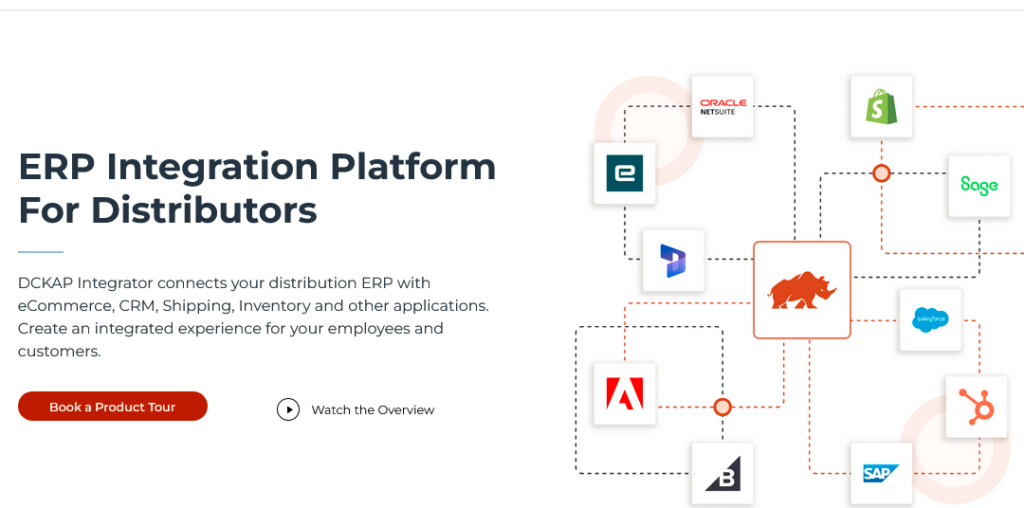iPaaS or integration platform as a service offers a systematic approach to seamlessly integrating and connecting applications or data regardless of where they reside.
Dell’s Boomi AtomSphere Platform is a popular iPaaS solution offering various benefits, however, what works for others may not work for you due to different business needs. This is where you need to explore Dell Boomi alternatives and competitors to make the right decision.
Contents
Dell Boomi: Detailed Features and Pricing
Boomi AtomSphere is a comprehensive iPaaS that offers complete application and data integration solutions. A leader in cloud integration, Boomi AtomSphere unifies workflow automation, B2B management, API design and management, data readiness, and application development. It is a single-instance, multi-tenant, cloud-native integration platform that offers automatic upgrades and scalability.
Key Features and Benefits
Here are some of the Boomi’s key features and benefits.
Integration
It integrates on-premises and cloud applications, data sources, and devices across hybrid environments. It also offers over 200M integrations which have been crowdsourced for machine learning, simplifying mapping between applications. Also explore the distinctions between Hybrid Integration Platform and iPaaS.
Master Data Management
Boomi helps build, enrich, and synchronize even disparate data across the enterprise with master data management services.
API Management
Boomi AtomSpehere Platform allows users to design, secure, and scale APIs (Application Programming Interface) as well as manage and govern policy and data access. Plus, users can build and publish any endpoint as an API.
EDI Management
It allows complete management of integrations and communications across the partner ecosystem and seamless data flow from back-end ERP (Enterprise Resource Planning). software.
Visual User Interface (UI)
A low-code platform with a drag-and-drop interface supports a number of projects. Boomi also offers developer tools for complex or specialized integrations.
Workflows
Users can create simple to complex workflows to improve collaboration. Plus, it allows rapid building and deployment of responsive mobile applications without much coding expertise.
Pre-Built Connectors and Reusability
It offers hundreds of pre-built connectors for datasets and third-party apps such as Salesforce, Shopify, and NetSuite. Users can also use the Connector SDK to build private, custom connectors. The Boomi Integration platform also provides various reusable components including APIs, connections, business processes, maps, etc.
Security and Compliance
Dell Boomi AtomSphere Platform offers enterprise-grade security and complies with ISO, FedRAMP, StateRAMP, VPAT, CAIQ, FIPS, HIPAA/HITECH, PCI DSS, SOC 1/SOC 2, etc.
Pricing
Flexible pricing structure for SMBs (small and medium-sized businesses) and Enterprise-grade iPaaS. Professional, ProPlus, Enterprise, and Enterprise Plus plans are offered based on various functionalities. A 30-day free trial period is also available.
Despite these functionalities, Dell Boomi may not be an answer to your unique needs. Pricing can be an issue for small to medium-sized businesses. Navigating the platform can be initially difficult for non-technical users. Additionally, data cleaning functionality is moderate compared to the competitors.
Let’s look at some of the best Dell Boomi alternatives that can be the right fit for your business needs.
1. DCKAP Integrator

DCKAP Integrator is an enterprise integration platform that helps distributors control data flow between different applications—ERP (enterprise resource planning), CRM (customer relationship management), ecommerce platforms, EDI (electronic data interchange), databases, PIM (product information management), and various other marketing tools—whether on-premise, in-cloud or a combination of two.
A plug-and-play iPaaS platform, DCKAP Integrator is delivered on the cloud and supports robust and seamless integrations and real-time data synchronization. It helps maintain data integrity, automate workflows, and reduce manual errors, ensuring peak operational efficiency and productivity.
Key Features and Benefits
- Low-code and ease of use
- Eliminates the need for specific coding knowledge to build integrations
- Drag-and-drop functionality for quick project implementation
- Versatile and simple interface with high user compatibility
- Centralized data for a single source of truth
- Pre-built connectors, flow designers, and advanced data mapping features to oversee the integration for non-technical users. Complete control over any custom field mapping.
- Logs all transactions, giving complete visibility. Manual sync feature is also available along with dynamic and batch sync.
- Custom APIs (application programming interface) to integrate multiple systems
- Stores data and files on AWS Cloud (Amazon Web Service) which complies with SOC 1/ISAE 3402, SOC 2, SOC 3, FISMA, DIACAP, FedRAMP, PCI DSS Level 1, ISO 9001, ISO 27001, ISO 27017, and ISO 27018
- Implementation time of 4 to 6 weeks with robust customer support
- Cost-effectiveness and affordability despite catering to distribution niche
Discover more features and benefits of DCKAP Integrator here. Some common use cases include API integration, ERP integration, CRM integration, and ecommerce POS integration.
Pricing
Transparent and flexible pricing plans with no hidden charges post-implementation or renewals. Standard, Premium, and Enterprise plans based on features, integration, number of users, customer support, etc.
Recommended Read: Decoding API Integration
2. Cleo Integration Cloud (CIC)

Cleo Integration Cloud is a cloud-based integration platform built to design, build, operate, and optimize end-to-end business workflows. It connects and integrates partners, SaaS, and legacy systems for seamless B2B integration across the enterprise. It also supports API-based, EDI, and non-EDI integrations and automates and orchestrates API, EDI, and non-EDI transactions, eliminating manual integration flows.
CIC offers tools and an environment for developers and business users to design and build business processes and integrations. With the option for self-service, managed-service, or a combination of both, businesses have control over integration strategy.
Key Features and Benefits
- Streamlines data across internal systems, eCommerce marketplaces, and modern applications
- End-to-end visibility for API and EDI-based integrations
- Data mapping and transformation capabilities along with process design and development features (multi-enterprise API and EDI-based integration)
- Supports onboarding on partners using AS2, SFTP, FTPS, APIs, secure portal
- A comprehensive library of business and application connectors, APIs, pre-built integrations
- Self-service integration design-time environment with low-code development capabilities
- Complies with SOC 2 Type 2, Drummond Certified AS2, ISO-27001, CCPA, and GDPR
- Cleo University for training; Cleo Connect (Annual customer conference)
Pricing
Flexible packages—Express, Essentials, Business, and Premium—based on features, connections, platform service options, connectivity and integration, etc.
3. MuleSoft Anypoint Platform

MuleSoft Anypoint Platform is a unified iPaaS solution that combines universal API management, integration, and automation, utilizing an API-led connectivity approach. It seamlessly integrates various applications, systems, data warehouses, etc., both on-premise and in the cloud.
MuleSoft was acquired by Salesforce in 2018, and it then became a part of Salesforce Integration Cloud.
Key Features and Benefits
- Can be deployed and run in any environment (cloud or on-premise) or architecture
- Pre-built APIs, connectors, templates, accelerators, and other integration assets
- Allows creating custom integrations with Mule SDK
- Enables business users to manage, scale, and secure APIs from a single platform
- DataWeave is a powerful language for advanced data transformation and aggregation. Plus, it enables the implementation of varied connectivity patterns for ETL/ELT processes
- Support tools, knowledge base, ideas portal, and active user community support platforms
- Complies with ISO 27001, SOC 1 and 2, PCI DSS, and GDPR
Pricing
Pricing is based on API management and integration capabilities. It offers a three-tier pricing model—Gold, Platinum, and Titanium.
4. OCI (Oracle Cloud Integration) Integration Services

OCI Integration Services comprise application integration, data integration, API full-lifecycle management, streaming, and process automation.
Offering prebuilt connectivity to SaaS and on-premises applications, process automation templates, and a low-code visual builder for web and mobile application development, it simplifies integration processes. For data integration, the Oracle Data Integrator comes with an extract-transform-load (ETL) architecture.
Key Features and Benefits
- End-to-end automation with centralized management and visibility
- Reusable templates and dataflows
- Pre-built adapters, application integration, and low-code customization
- Real-time data integration, replication, and stream analytics
- Allows users to design, build, and secure internal or external APIs
- Makes suggestions based on machine learning for quick data mapping
- B2B capabilities for EDI and safe file transfer
Pricing
A comprehensive pricing plan for application integration and data integration services. Charges vary based on the messages per hour and OCPU per hour.
5. Jitterbit

Jitterbit’s Harmony is a low-code, cloud-native integration and application development platform, helping integrate hybrid environments of SaaS, legacy systems, and on-premise applications.
It enables businesses to automate workflows, develop new applications, and integrate systems seamlessly to streamline business processes. It also performs full API lifecycle management tasks.
Key Features and Benefits
- User-friendly intuitive visual interface
- Enables business app creation with a low code, “drag-and-drop” visual application builder
- Developer-friendly platform to create, publish, run, and analyze APIs
- Support for hybrid environments (SaaS, legacy systems, on-premise, etc.)
- Reusable pre-built integration assets and components for scalability and customization
- A centralized dashboard for controlling and monitoring workflow integrations and processes
- Complies with GDPR, ISO 27001, SOC 1 and SOC 2, and HIPAA
- Support for different devices such as laptops, monitors, tablets, and phones
- A designated customer success manager
Pricing
The pricing structure includes Standard, Professional, and Enterprise plans based on features, connectivity, API platform, and support and training. Enterprise license agreements (ELA) are also available.
6. Talend Data Fabric

Talend Data Fabric is a low-code, platform that unifies data integration, application and API integration, data quality, data integrity and governance, and API development. This cloud-independent solution supports multiple deployment architectures and meets end-to-end data management needs across the organization.
It supports full API lifecycle and helps users visualize and implement APIs, integration patterns, and mappings through an intuitive interface. Consider other ipaas alternatives for your next data integration
Key Features and Benefits
- Supports both data lifecycle and API lifecycle
- Deploys in the cloud, on-premises, multi-cloud, or hybrid-cloud
- Tools for ELT/ETL and change data capture (CDC), making it easier to integrate batch or streaming data
- Reusable assets including APIs and microservices
- Runs any integration pattern including pub/sub, point-to-point messaging, ESB, etc.
- Technology partnerships and integrations with providers including AWS, Microsoft Azure, Snowflake, and others
Pricing
Talend offers plans to meet business needs—Stitch, Data Management Platform, Big Data Platform, and Big Data.
Final Words
In the rapidly evolving world of cloud-based integration services, businesses are constantly seeking solutions that can address their unique challenges and needs. Gartner has highlighted the significance of iPaaS solutions in eliminating data silos, inefficient workflows, and information-sharing limitations. Therefore, when choosing an integration platform, delve deep into vendor reviews, understand the features and benefits, and assess if it aligns with our organizational needs.
DCKAP Integrator is a market leader in iPaaS specially crafted for distributors, helping businesses stay agile and responsive. To schedule a demo and know how it can make a significant impact on your business, get in touch with us today.




